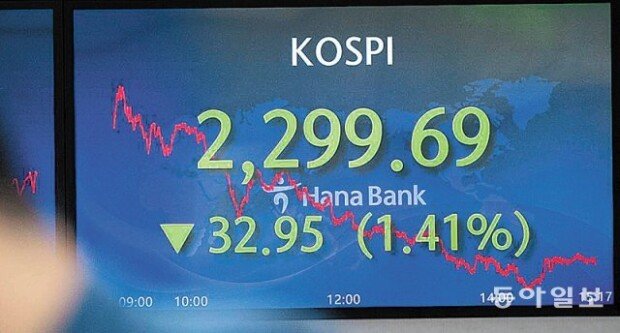Korea’s trade deficit hits worst level on record in first half
Korea’s trade deficit hits worst level on record in first half
Posted July. 02, 2022 07:47,
Updated July. 02, 2022 07:47

The trade deficit of the first half of the year has exceeded 10 billion dollars, which is the record high. Businesses projected that Korea's export, the growth engine of the national economy, may grow by only 0.5 percent year-on-year in the second half of this year. Economists sounded the alarm that a chronic deficit in trade balance may bring a long economic recession.
According to the trade statistics for the first half of this year announced by the Ministry of Trade, Industry and Energy on Friday, the country’s export volume in the first half increased to 350.3 billion dollars, up 15.6 percent year on year, and imports rose to 360.6 billion dollars, up 26.2 percent. The export volume was a record-high for half of the year but it saw a 10.3 billion dollar deficit in the trade balance due to the surging prices of energy imports.
This time’s trade deficit surpassed 9.16 billion dollars, the previous all-time high level for the first half of the year. Moreover, the trade balance logged a 2.47-billion-dollar deficit in June, staying in the red for three consecutive months. It marked the first time in 14 years since in June-September 2008 that Korea registered trade deficits for three months in a row.
The export outlook for the last half of the year is grim. It is forecasted to see a 0.5 percent increase compared to the same period of last year, according to the Federation of Korean Industries’ “Survey on the Export Outlook in H2/2022” of 150 companies in 12 export-oriented sectors among the top 1,000 businesses by turnover. Firms that predicted a decline in export pointed out weakened export competitiveness due to soaring raw material prices (41.2 percent), supply chain bottlenecks caused by skyrocketing shipping and air freight costs (21.9 percent), and worsening economic conditions in key importing countries (21.1 percent) as main risk factors.
The domestic stocks have plunged for consecutive days. On Friday, the benchmark KOSPI retreated 27.22 points, or 1.17 percent, to close at 2,305.42. The stocks dropped by one percent level for three days in a row, falling to a year-low on Friday. The index once hit an intraday low of 2,291.49, briefly dipping below the 2,300-point level for the first time in 20 months since November 2020.
“Korea’s economy lacks resilience as it is already in a low growth phase on a long-term basis,” said Kim Sang-bong, a professor of economics at Hansung University. “To overcome the current crisis, we should speed up the reforms in our industrial structures.”
kalssam35@donga.com · minwoo@donga.com







